#And how both events parallel each other (a killing of innocents for the greater good)
Explore tagged Tumblr posts
Text
Pardofelis and Kalpas getting Rin and Sakura out safely has lived in my mind rent-free for days now
#Damn I love that she had people who were more loyal to her than the entirety of humanity#I am actually looking forwards now to know more of them if only for this storyline haha#Picking locks and going unnoticed Pardo working alongside burly noisy wreck it all Kalpas in a team together#making it work in the weirdest most annoyed with each other possible way#only to get someone's little sister out of a shitty situation is like cherries in winter actually haha#I talk too much#I should probably delete this later#Not to be like 'the Alley group are the most involved bunch in this event' but the Alley group are the most involved bunch in this event#Kalpas' anger at Aponia's discipline being indirectly cause of the killing#How his own discipline plays a part in his line about Rin being an 'innocent little girl'#Pardo wanting to meet Rin and grieving Sakura and wishing to have been there because for once she thinks her skills could have helped#Kalpas still grieving and angry 50.000 years afterwards‚ still thinking they would have lived had he been there‚ even if it meant dying#I don't know. I really like that the people most linked to the Alley are the people most linked to the Rin event#And how both events parallel each other (a killing of innocents for the greater good)#How some have repeated roles and how some had the opposite roles and how some wished they had had the same roles#How those who were present were absent and how that changed everything#How changing everything is making the second event end the same way the first one did#Anyway...#I have a favourite HI3 character I guess haha#I could punch myself
2 notes
·
View notes
Text
The Leverage/Stargate fic I’ll probably never write
I have an idea for a Leverage/Stargate crossover fic but no drive to actually write it. So I’m going to lay down the plot summary of the story that exists in my head. If anyone wants to take some or all of this idea and flesh it out into a full story, you’re welcome to it.
AU!Eliot Spencer went to work for Stargate Command early on in its existence and has been there ever since. He's extremely good at his job but in a ruthless way that has everyone at best wary of him and at worst terrified. He's the guy you send on the most dangerous missions, but he's also the guy you send when you want something awful doing without any questions asked.
The Goa'uld have put a bomb in a child and killing the child is the only way to stop it going off and killing thousands? Eliot Spencer is your guy. The megadeathray gun is surrounded by slaves as human shields? Eliot Spencer is the guy who will blow it up while everyone else is busy arguing about whether there's a better way. Need someone to headshot a Goa'uld and not care about the innocent host? He's the guy who will pull the lever on your trolley problem while everyone else is still arguing the ethical ramifications.
They keep him around because he is really good at his job but also because everything he does is technically for the greater good and you can see the logic in shooting the guy with the alien virus before he can spread it and cause a plague but still, you'd think the guy would show a little remorse about shooting an innocent person in the head. So he doesn't really have friends in the SGC just reluctant allies, but he's doing good and saving the world in his own, violent way.
But then one of the science teams discover something that's giving off the same sort of energy readings as the quantum mirror and Eliot is there to act as bodyguard/escort to the scientists. They bring the shiny, aliens toys back through the Gate but then something gets activated by accident, zapping Eliot, and then suddenly canon!Eliot is there in the base, with an apron and a wooden spoon because he was in the middle of cooking dinner.
Naturally, he's immediately on the offensive because he's apparently been kidnapped and these people are all in military uniform, so he starts fighting and takes down six marines with a wooden spoon but then AU!Eliot is there fighting him and they're evenly matched. Neither can get an upper hand and they only stop when someone shoots them both with a zat while they're locked in combat and knocks them out.
Eliot wakes up heavily restrained and they try to explain that they think he's been pulled from a parallel universe and of course Eliot doesn't believe a word of it because it sounds like something from one of Hardison's weird TV shows, and the guy who looked like him was clearly a trick. He's scared that the other Eliot is part of some plot to get to his team and so of course he's not going to give them any sort of cooperation. Everyone else is scared of him because they know how scary their Eliot Spencer is and they don't want to get on the wrong side of him, but they need to get one of the techs to try and undo what was done, so they get one of the team to bring in the alien gizmo - and it's Hardison.
The Hardison of this world was still a computer genius and got recruited to get alien and human tech to work together. He doesn't really know Eliot because the techs tend to spend most of their time with other techs generally, but also that guy's scary. He really doesn't want to be in the same room as two of them, glaring at each other, because if their Eliot Spencer is the good version, he really doesn't want to know what the evil mirror universe Eliot Spencer is like. But he drew the short straw so he's got to come in and try to get some tech they barely understand to zap this guy back to where he came from.
Canon!Eliot recognises Hardison at once but thinks that he's here as part of a con as a rescue mission, so he pretends to have no idea who he is, but plays along. When Hardison starts explaining about parallel universes and alternate timelines and quantum mirrors, Eliot listens and pretends he might start to believe this technobabble and asks questions like he's starting to be convinced. The first test to send Eliot back to his universe doesn't work but he agrees to cooperate if Hardison keeps working to send him home, because he needs to get out of these restraints anyway if Hardison's rescue plan is to have any chance of succeeding. And the other people who are around standing guard or watching the events unfold are surprised that Eliot would believe Hardison over an alternate universe version of himself.
"Of course I don't trust me. I know me!"
But AU!Eliot knows him too and thinks that he's been convinced too easily and that this is a trick. He knows he would never be so quick to believe a total stranger and thinks that Eliot is just lying to get out of the restraints and then he'll start fighting everyone again, probably taking that tech as a hostage.
But while all this is going on, people are referring to Hardison by his real name and talking to him like he's been here for years, and canon!Eliot starts getting weirded out because Hardison would never use his real name in a con and he has a very distinctive tell when he's playing a part and he's not showing that tell now.
AU!Eliot wouldn't just announce that he doesn't think this guy is telling the truth so he beckons whatever senior officer is present over to the far corner so that they can talk quietly but he can still keep an eye on canon!Eliot and warns him about what he thinks the guy is planning. Meanwhile, Hardison is still running tests on canon!Eliot with the alien tech and now no one is close enough to overhear, so Eliot lets his hair hang in front of his face to shield his mouth from the security cameras and whispers, "Is Parker okay?"
Hardison just goes, "Who's Parker?" in a voice loud enough that everyone in the room can hear it.
"Damn it, Hardison!"
The senior office asks Hardison what happened and he repeats back exactly what Eliot said to him. That's what convinces Eliot that this is real because he knows that Hardison would never do anything to expose Parker and he wouldn't blurt something like that out in the middle of a con after all the years they've been doing this.
"You're not my Hardison, are you?"
"Your Hardison?!"
And Eliot tries to then convince them that he now believes them, even though they're more suspicious than ever because he was pretending to believe them before. Eliot just looks at Hardison and says, "I swear on your Nana's chicken, chilli caserole recipe that I won't hurt you if you let me out of these restraints."
Everyone else is really confused but Hardison is astonished because Nana's chicken chilli caserole recipe is sacred. It's a family secret, but she will only give the recipe to family members she deems worthy, meaning that only one of her foster kids has ever been told it and Hardison (who consists off gummy frogs and orange soda in every universe) has never so much glimpsed the page it's written on. It's a meal that is served on the specialest of special occasions and Nana would guard that recipe with her life.
"You know Nana's recipe?"
"I proved myself worthy at your engagement party. She gave me the recipe for the wedding."
"I'm married in your universe?!"
"Not legally." Because three-way unions aren't legal and besides, the guy they had officiate their wedding dropped out of priest school to become an insurance agent con artist, so it's not exactly official, but that's never stopped them. Hardison is still confused but thinks that maybe it wasn't legal because of gay marriage rules and this means he had an unofficial commitment ceremony to Eliot Spencer. He has to sit down while he processes this.
After some discussion, they let Eliot out of the restraints and he spends a little bit of time in the SGC while Hardison works on the tech. He talks to the alternate version of himself and suggests he take a cooking class and tells him he should get to know Hardison better because, "Once you get past the annoying surface part that makes you want to murder him, he's one of the smartest, bravest, and best people you could ever hope to meet, and half the irritating stuff he does is just to make you smile."
"And the other half?"
"He's just being irritating," but Eliot says this with a soft, caring smile that AU!Eliot hasn't seen in his reflection in a very long time and that makes him think it's worth giving it a shot.
And Eliot talks to Hardison too, telling him that he has absolute trust in his ability to work out all this alien tech stuff and get him home safely because he has people there who need him because he doesn't trust Hardison to feed himself any with more nutritional value than gummy frogs without him there to take care of him. And he convinces Hardison to take a chance on this universe's Eliot because if anyone can get past his defences, it's him. Or Parker, but she doesn't seem to be around in this universe.
And that seems like the perfect moment for Parker to appear out of a vent because she wanted to give herself a challenge breaking into a facility with more security than any museum and she's been listening in on all of this stuff as it unfolds.
So this universe's Hardison and Eliot convince the SGC guards not to shoot Parker because she has a really useful skillset, and canon!Eliot wishes them luck as he gets sent bak to his own world, where his Parker and Hardison are in the middle of tearing the criminal underworld into a million pieces to find out what happened to him.
127 notes
·
View notes
Note
What do you think of the Push Fake Reko(Save Reko) or Spare her(Save Alice) choice as it relates to the themes of logic vs. emotion? My one friend views Reko as the more emotion leaning one since thats the only why she and Alice can potentially make up. But I think it's more logical since to do that you push Fake!Reko to her death because she's obly a doll, even though she's begging for her life.
Why pushing Fake Reko is logical and sparing her is emotional


This is a fantastic question. I was thinking about it for days after you sent it in, going back and forth. The "push or spare Fake Reko" choice feels a bit messier than other logic/emotion choices, such as "kill Kai (logic) or kill Sou (emotion)" in the First Main Game, or "kill Kanna (logic) or kill Sou (emotion)" in the Second Main Game. That's partially because, as you mentioned, this choice ends up determining the fates of the real Yabusame siblings rather than Fake Reko and Gin, whose fates are sealed. Unlike other choices, Sara can't anticipate the consequences. This makes it tricky to analyze in hindsight, since we're influenced by the unexpected outcomes. That's what your friend was doing by looking at the emotional results of pushing Fake Reko. I sympathize with your friend because I also want to analyze the complete story, but I still think it's most important to analyze Sara's mindset in the moment of the choice itself. That's why I argued that killing Kanna was logical for Sara, even though a genre-savvy player might logically assume that killing a child could lead to a bad ending. We need to be able to set aside our greater knowledge as players, and put ourselves in Sara's shoes.
Another reason this choice feels different from other choices in YTTD is because it has almost nothing to do with Sara's self-preservation. Instead, this choice is based on a more philosophical question: how do we measure the humanity of a robot doll? And there's another question baked into this choice as well: are we willing to become a murderer to save a human child? Can we rationally justify this murder?
I recently played through this choice, and after reviewing the narrative, I came to the same conclusion as you did: I think it's logical to push Fake Reko, and emotional to spare her.
Fake Reko makes an emotional appeal to save her life. She says that she has suffered. She says that she considered Sara a real friend. She sings a beautiful song full of emotion. Even though Sara can logically trap Fake Reko by pointing out that the real Reko wouldn't have sung that song, that only proves that Real Reko and Fake Reko are different people. It's much more difficult to prove that Fake Reko doesn't have a right to live, because Fake Reko's robotic heart still feels real. Even if we rationalize that she's "only a doll," my heart still wants to save Fake Reko.
When Fake Reko sings, the game's dialogue reinforces that Sara is being swayed emotionally to save Fake Reko. Sara's heart connects with Fake Reko's song, even as her mind reels to prove that she's different from Real Reko.
(I've never heard a song from Reko's band, so I can't compare her singing with the real deal...)
(Even so... Could a doll perform vocals so full of emotion...?!)
However, what fully sold me on my interpretation of this choice was hearing from Mr. Emotion and Mr. Logic themselves. This is how Sou and Keiji react to Fake Reko's emotional defense of her own life.
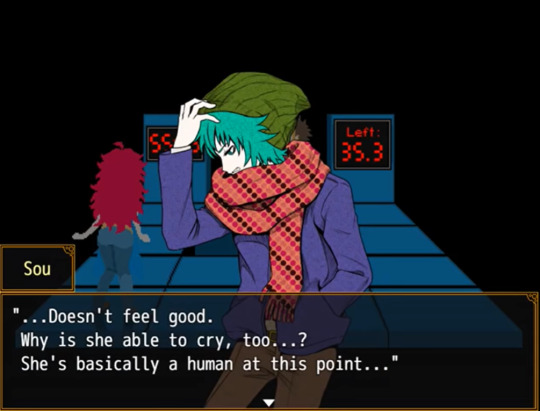
Sou: ...Doesn't feel good. Why is she able to cry, too...? She's basically a human at this point.
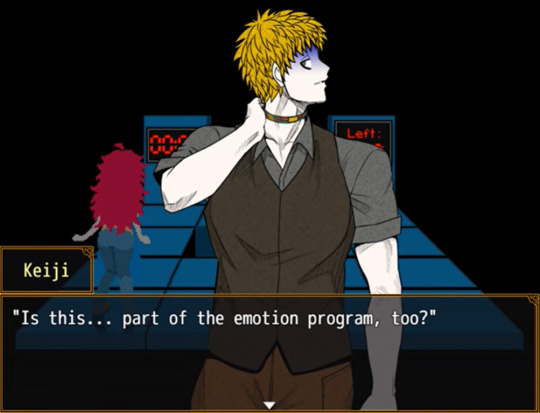
Keiji: Is this...part of the emotion program, too?
Notice that Sou talks about his feelings. He says out loud that killing Fake Reko "doesn't feel good." He connects with Fake Reko's ability to cry, and he ends by affirming her humanity. Sou's sprite is also clearly distressed.
Meanwhile, Keiji asks a logical question that would affirm Fake Reko's robotic nature. Yes, she may feel like a human, but we can still rationalize that she's not. Even though Keiji looks bothered, his expression is more muted than Sou's.
We also have Kanna's emotional outburst.
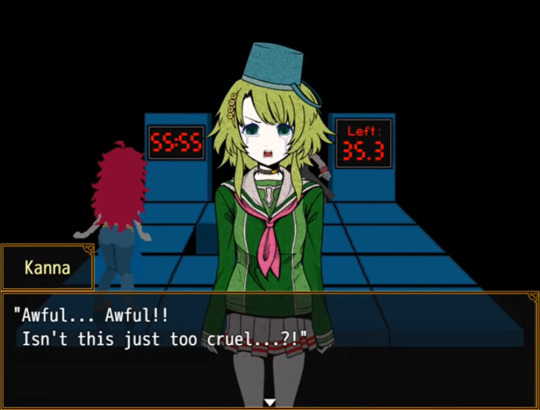
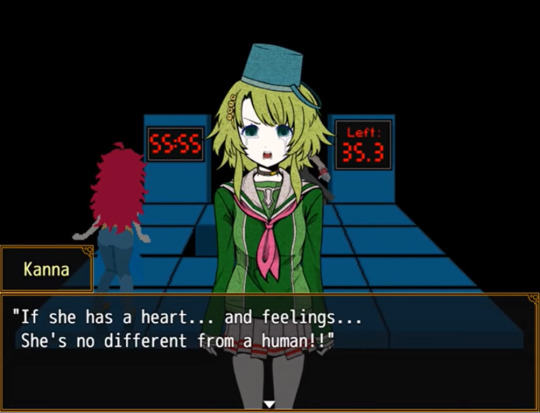
Kanna: Awful... Awful! Isn't this just too cruel...? If she has a heart... and feelings... then she's no different from a human!!
Kanna is an emotional character like Sou. I believe that Kanna is the character most like young Shin Tsukimi. The meaning of Kanna's words is the same as Sou's words, but expressed more strongly. Additionally, Kanna's expression is even more despairing than Sou's face, with tears streaming down her face.
When I pictured Kanna, Sou, and Keiji in Sara's place, it became clear to me that sparing Fake Reko was emotional while pushing her was logical.
If Kanna was there, I don't think she could do it. Killing Fake Reko would be too heavy a burden on her young heart. She knows it's wrong and her heart screams at the injustice. All Kanna can do is offer up her own life in the event that Gin is about to be executed. She asks Ranger to take her instead. That's extremely brave of her, but ultimately ineffective since it's against the rules.
If Sou was there, I think he could do it, but he would hesitate for a long time, and he would probably cry. Sou is capable of making difficult choices and doing what needs to be done, but he would still connect emotionally with Fake Reko. Sou and Fake Reko actually parallel each other as "the harsh part of yourself who would kill the kind part of yourself to survive." When Nao calls out Fake Reko's threats against her and Sara as a bluff--Nao states that Fake Reko couldn't kill anyone she considers a friend--I believe that statement applies to Sou as well. Both Sou and Fake Reko are less tough than they appear; they'd rather kill themselves than someone they love. (Sou metaphorically kills himself and Fake Reko literally kills her other self, but Sou won't hurt Kanna, and Fake Reko won't hurt Nao or Sara.) Killing Fake Reko would be difficult for Sou, but I think he would still make the same hard choices as Nao. Especially if he was motivated to preserve Kanna's innocence, much like Nao was motivated to preserve Sara's innocence.
If Keiji was there, I think he would bury his guilt and he wouldn't hesitate for long. Keiji is the most jaded character with a heavily burdened heart. He's already killed his childhood hero and his ex-coworker, so shouldn't killing a robot woman be easier to justify than either of those? Keiji is the best at rationalizing and prioritizing the greater good. In this case, the greater good means killing a robot doll to save a human child. I also think that Keiji is a responsible, brave sort who would prefer to take on this burden himself, rather than let somebody more innocent suffer through this choice. I imagine such logical thoughts would spur on Keiji to be the quickest to push Fake Reko to her death.
That's why I believe pushing Fake Reko is logical while sparing her is emotional. You need to be able to set aside your feelings in order to kill Fake Reko. You need to be able to rationalize and think of the greater good. Emotional characters would struggle more with this choice because our hearts insist that Fake Reko deserves to live, even if she's different. Recognizing our common humanity with "different" people, especially vulnerable people, is a good moral instinct. She still feels "basically a human." Can we ignore that injustice in order to rescue Gin?
I'll share a few final thoughts about this choice.
Another tragedy at the heart of this puzzle is that it was designed by a doll, Rio Ranger. Rio Ranger is a doll with an inferiority complex who feels jealous of humans. His own solution to this puzzle--the humans have to kill a doll to save one of their own--feels like a way of justifying his own hatred of humans. Obviously the nicest solution to this puzzle would be if we could convince Rio Ranger that we recognize dolls' humanity, but Rio Ranger is an unfinished doll who can't feel compassion, so we can't reach him.
Finally, I want to discuss the cathartic reunion scene between Real Reko and Alice in the event that Alice dies. Since the only way to get a cathartic scene after the Sou-Kanna choice is to choose "emotion," I understand why your friend would think that pushing Reko must be the emotional choice. However, I think the parallel between these cathartic scenes is more complex than simply choosing logic or emotion. Both cathartic scenes reward you for two things:
Sara chooses to save a child, the most vulnerable among us. Either Gin or Kanna.
Sara helps a guilty man along the path of redemption. In the first case, she must help Alice try to reconcile with Reko in his bongos sidequest, which is the only way to trigger the bittersweet reunion scene. In the second case, she helps Shin save a little girl and become himself again.
Protecting the most vulnerable and giving the guilty a second chance are what really matter here. Even though pushing Fake Reko is logical and killing Shin/Sou is emotional, Sara is still making the same kind of moral decisions.
Thank you for the stellar question, Anon.
#your turn to die#yttd#kimi ga shine#reko yabusame#alice yabusame#your turn to die spoilers#sou hiyori#keiji shinogi#kanna kizuchi#shin tsukimi#rio ranger#fake reko#mine#meta#asks#I'm really proud of this one :)
89 notes
·
View notes
Text
Dark Phoenix, spoiler review.
Things I liked:
This film gets that Charles is a privileged, manipulative person. This has always been clear in the comics, but the films have barely touched on it (except the one where he was a drug addict)
The effects (most of them, excluding Mystique’s make up, what the fuck happened there? it was better in the 90′s)
The fact that the anti mutant forces are from the MCU, which I found mildly hilarious.
Kurt
X dad is mad at Jean, so she goes to Dadneto
Things I didn’t like:
So much of the character work and backstory came off as clumsy, especially for Jean herself. We should h ave had that in previous films (how good would it have been as a side plot in an earlier film to have Charles take in Jean and go into her mind, with it being presented as a good and right and protective decision, and then have the fallout hit later?)
And this goes for other parts of the plot too, the alien invasion side of things felt barely sketched out, with no meat to it.
The villains were kind of skrull like and Jean out of nowhere being like “my emotions make me strong” felt very Captain Marvel derivative (the emotions make me weak/strong thing would have made sense if we had seen flashbacks to Charles conditioning her to repress everything, but as it is it’s a really weak moment)
Speaking of derivative, I need to watch the original trilogy again, because I am not sure if there’s some scenes that are supposed to be referencing how things went down in the original timeline with Jean.
Several characters were under-utilised, especially Peter and Ororo. They got a couple of lines each, but they both could have been cut without altering the plot and that’s dumb. Kurt got a bit of an arc, I guess, but they all deserved more. (Again if some of the backstory had been done in a previous movie then there would have been more space for all the characters to interact) (or if this film had been split in two, the first film having more backstory, lots of emotional scenes of Jean growing up and Charles teaching her to be repressed and going into her mind, but also playing games with her and putting her pictures on the x fridge, then ending with Jean killing Raven and going on the run, and the second film focusing on the alien threat and the idea of the greater good and how one terrible thing (Jean) has to be used to face off a greater threat (Aliens) and how awful that is for everyone involved (giving some real depth to Charle’s emotions and retirement as he was literally doing the same thing to Jean that the government are now, he treated her badly because he felt it was the only way to protect her from the world who would treat her worse)
Things I’m not sure about:
It’s weird having an x men film without wolverine. I was kind of expecting at least a cameo.
Jean/Scott felt forced to me, but it always feels forced to me so ymmv
I would have liked to see what was happening to other mutants as the government came after Jean and the high profile mutants. We hear ‘internment camps’ mentioned on the tv, but it would have been nice to see what was happening away from the core cast, especially as a foil to Charles’ attitude. As he is calling the president for example, and gets hung up on, we could have faded to shots of violence against innocent mutants in their homes etc.
I think they were afraid of being seen as having a ‘message’, so they pulled back from showing the sort of violence the government can cause for minorities (like you can pretty easily find parallels to current events in America, even the fact that Jean wasn’t dangerous until she was forced to be by an outside force, and a perceived threat being treated as an excuse to harm anyone even remotely connected to her, but having baby mutants being taken from their parents because they are seen as dangerous might have been a little too on the nose)
Overall: an ok movie. It could have been a lot better, but it didn’t make me fall asleep or want to tear out my own eyeballs, so around a 4/10.
#dark phoenix#x men#x men dark phoenix#spoiler review#spoilers#nonsense watches#nonsense reviews#films#movies#marvel
6 notes
·
View notes
Text
Rebels Midseason Trailer Breakdown
I’ve been meaning to do this for a while, but here it finally is. With less than 2 weeks before the show starts, I have my rabid superfan analysis of the Rebels Season 4 midseason trailer. Warning: long post as I am very excited for the second half of Rebels and have an extensive knowledge of Star Wars to be applied in situations in which it may not actually be required. Thoughts below the cut:
It starts on Lothal. Everything traces back to Lothal. It’s where our story began, and ultimately, where it will end. The show and the trailer are returning to their roots, back to the messages of family, and home and growth. The trailer shows Ezra’s journey with this, again, beginning with shots and narration from seasons past. It’s a reminder of how it all started and how far he’s come.
Then, it’s Ezra’s experience with the Force. We see him on the Jedi Temple on Lothal- against the backdrop of nothingness and stars and strange white lines that he sees when he meets Yoda for the first time- similar imagery appears later on, in the new footage.
Next, Malachor.
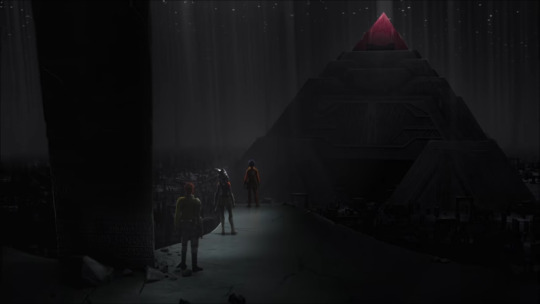
Again, a significant event in Ezra’s life. There began his grapple with the Dark SIde- and as we see in the next shots, it’s continuation. Significant moments are shown, with he Sith Holocron as well as the Bendu, and his attempts to understand the Force, especially with his connections to animals, which, as we know from Season 4, has been important with the Loth Wolves and Loth-cats.
Not to mention we see AHSOKA! It’s been a season and a half without a mention of her, but now she’s in the trailer. It this a coincidence? I think not. It never is. Dave Filoni has promised answers and there are starting to be more and more hints of such a thing. In the flashbacks, there are two shots of her- both involving Anakin or Vader (Malachor where they fought and with the hologram she kept of him (below)).
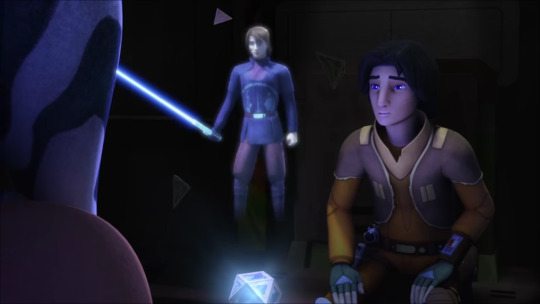
Back to family. There’s the holo of Ezra and his parents, a shot of Rex, Gregor and Wolffe- who we see return in the new footage. As Qui-gon Jinn once said, everything happens for a reason. Every shot from past seasons is important- each reminder of what was is a hint at what will come to be.
Then SABINE WITH THE DARKSABER- a small but effective reminder of her own journey.
Hera narrates about hope, and again, the trailer returns to the main themes of the show (and Star Wars as a whole): hope and family. For four years, we have watched this small ragtag crew grow together, fight together, inspire and struggle and hope together. These fundamentals are what have made this show so good, and the trailer truly emphasizes this.
Now, is this next shot so innocent? No. Of course not. Those are convors- the birds that have, throughout both Rebels and Clone Wars, symbolized Ahsoka. As this video points out, it as always been present during times where she has had to overcome the greatest struggles in her life.
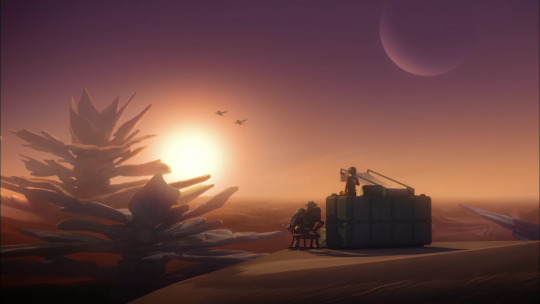
After that, on to the greater struggle and bigger picture: the fight against the Empire. Ezra and the crew’s losses and wins, their moments of inspiration and fight against the Empire. The importance of what their small team, and hope, can do.
At 1:20, there is the first new footage. Again, as always, it starts on Lothal.
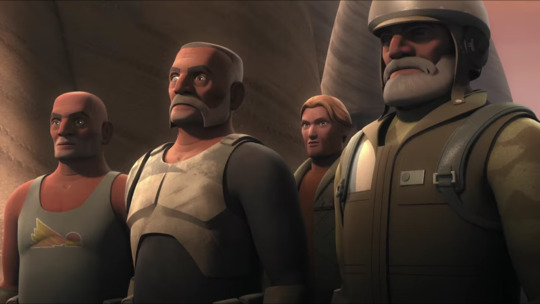
We see characters, new and old! THE CLONES ARE BACK! as hinted by the previous footage. Rex is in a uniform very similar to that of the Rebels on Endor- Filoni has all but confirmed he makes it there. We can only hope.
It’s go time- the words and music carry a sense of urgency and determination.The first words spoken are Ezra’s: “We can do this together” as we again return to the theme of family and the importance of being together.
Kanan speaks next- I don’t think he’s replying to Ezra, but he says “Let’s go get Hera.” THEN HE CUTS OFF HIS HAIR I AM DEVASTATED.
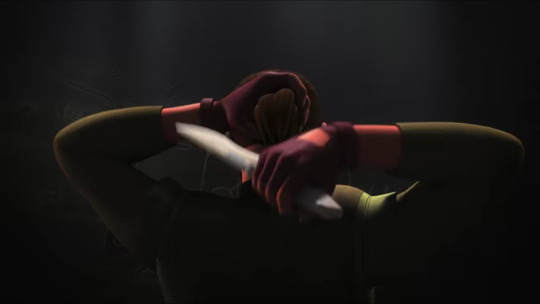
I figure this happens early on, given that it looks like he’s still in the caves of the wolves. There are faint markings on the wall in the background and the knife he’s holding looks like a shard of rock.
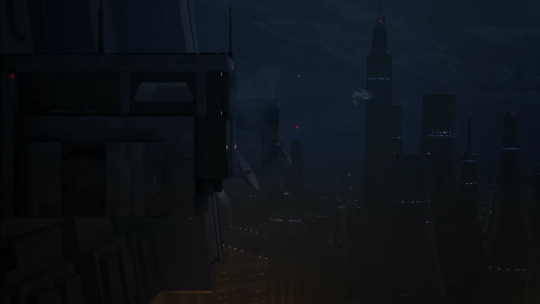
Finally, there is Hera, in a prison uniform but looking healthy and alive. She warns the people guarding her that they’re “in terrible trouble.” She knows Kanan is coming- and he’s not messing around. The little white blur in the screencap above is a stormtrooper being thrown out of the window. When it comes to Hera, Kanan shows no mercy. Pity those who stand in between Kanan and Hera; they will never stand a chance.
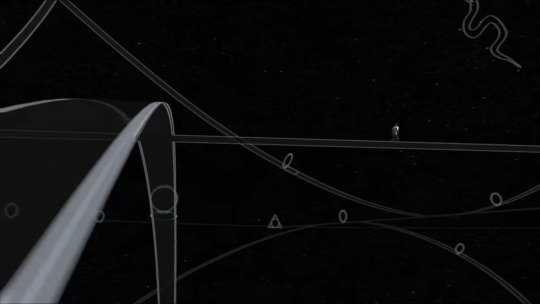
So, as evidenced by all the previous times in a Lothal Jedi temple, we are probably back in one- it’s the same designs as the before, the same starry backdrop. In the top right corner, there is a drawing of a snake. This likely doesn’t have much significance, but it does remind me of the pictures in the Lothal caves. Additionally, the triangle shape looks kinda like a one-dimensional picture of a holocron, and no, I am not grasping at straws, I am just analyzing every single thing I see and hoping it means something.
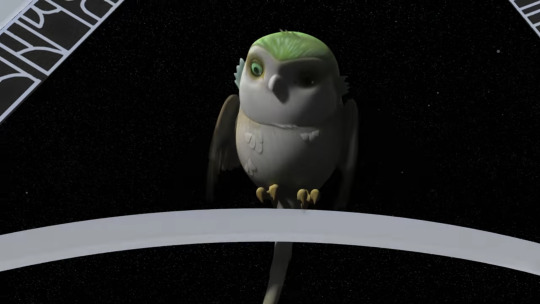
And in this temple, what do we see? A convor!!!!! Hints of Ahsoka, NEW hints of Ahsoka AT LAST! Not only that, but it’s the same color convor as the one at the end of Twilight of the Apprentice, the one that appeared just before the last shot of Ahsoka Tano we have to date. Not to mention, of course, that this bird has the same color scheme as the Sister from the Mortis arc- yes, the one who gave her life for Ahsoka. She’s coming y’all. There’s no doubt about it.
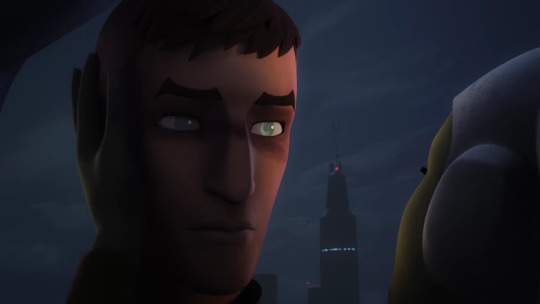
Ugh, the hair. Hera hates it, and so do I. However, he does look so young. Less like a man weighed down by tragedy and war. More like the man Hera first knew, when he was more free, more innocent, more open and blatantly in love with her (not that he isn’t now). It’s a callback to what once was, to who he was as Caleb Dume, and what could have been, in simpler times, happy and free and just a man who wanted to escape his past with Hera. The young look and short hair a very effectively conveys this message, and I think they are both realizing: that they should treasure and love each other while they still have the chance, before the war prevents that from ever happening.
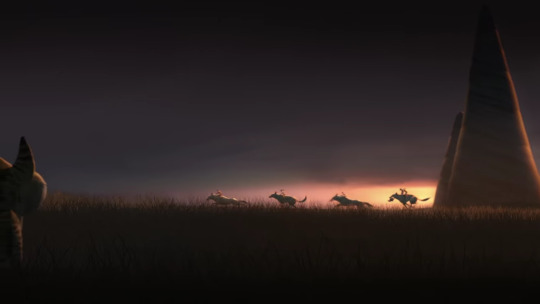
Back to action! Loth wolves running while a Loth-cat watches on. They have been important figures, both to the plot of the story and in Ezra’s journey with the Force. I have no doubt they’ll remain important ‘till the very last episode.
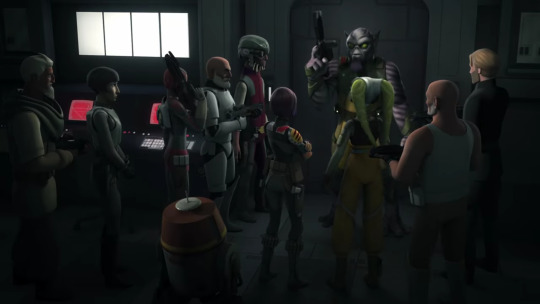
EVERYONE IS TOGETHER! The crew, Kallus, Rex and Gregor (Wolffe noticeably absent), Kallus, Hondo, Ketsu, Ryder and what looks like Governor Pryce in handcuffs. What a party. Forces are united! Everyone is brought together for the end, and the series won’t end without a proper goodbye, without doing each character justice.
Fighting on Lothal! An epic battle comes, no doubt waged by Thrawn.
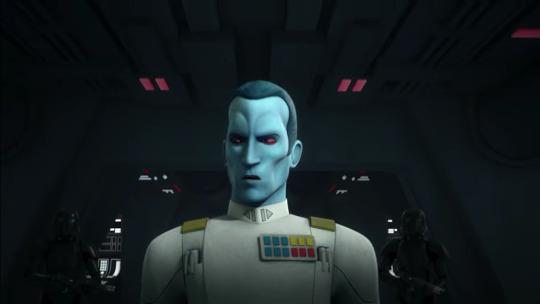
Thrawn appears once in the whole trailer. This makes me wonder how big of a role he’ll play, but then again, he could just be pushed aside in the trailer to make room for the main themes of the show. Either way, it looks like he’s doing his job of making life hard for the Rebels. No matter the size of his role, there’s little doubt he’ll go down without a fight. His story will likely take a major turn, and because of the significance of his character, we’ll probably get some answers as to his fate. He’s too important to be killed off or finished in a comic or a book, so the best choice is in this show… or in whatever Filoni is working on next.
But Lothal is under attack and Thrawn’s assassin is back too. Obviously, this is not going to be an easy fight. I do believe the Rebels will win, but at what cost, I cannot say. Besides Hera, Chopper and Rex, who have been cryptically confirmed to survive to and past the Battle of Endor, I’m not certain of any character’s survival. Remembering that this is supposed to be a children’s show, I don’t think any of the Ghost Crew will die, but Kanan and Ezra are conspicuously absent from the OT, so it’s more or less a given that something will happen and they have to leave. As for the side characters like Kallus, all bets are off. Anything can happen, but I truly believe that Filoni will do his characters and their stories justice, no matter what happens.
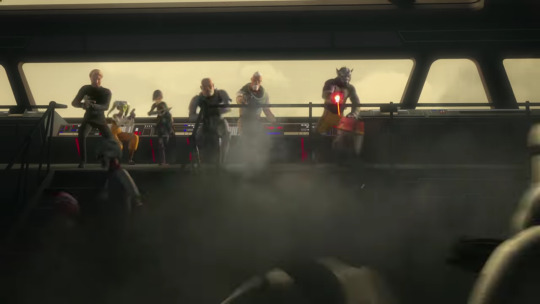
This next really cool shot looks like it’s on an Imperial Star Destroyer or base. Judging by Ryder’s presence and the backdrop, it’s probably still on Lothal. Whatever they’re doing- looks like an infiltration mission- I hope it goes well.
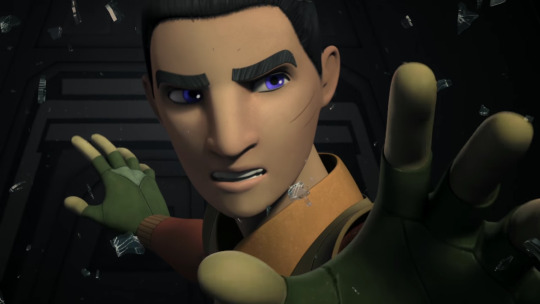
MORE CALLBACKS TO THE MORTIS ARC! Ezra’s stance here immediately reminded me of when Anakin had to choose to save Ahsoka or Obi-wan on Mortis win the screencap below. I noticed the way the light permeates the floor, just like the surface of Malachor, and the golden designs on the edges look like the white designs from inside the Lothal Temple. Again, this is a significant parallel with Ezra and Anakin’s struggle with the Light and Dark side of the Force, as well as what occured on Mortis with Ahsoka.
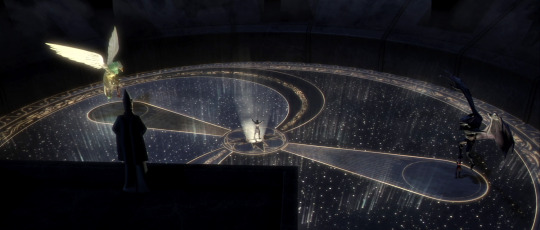
SHEEV PALPATINE ENTERS! He says Ezra’s name; he is a threat, he is taunting him and he appears in a blaze of blue fire.
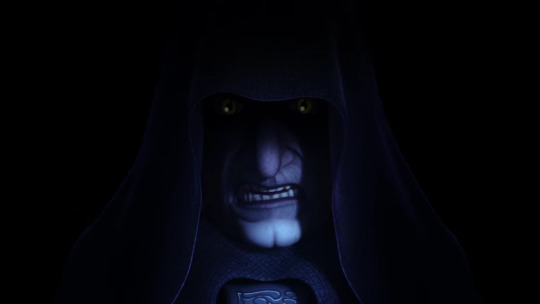
HOWEVER he’s not in the flesh!
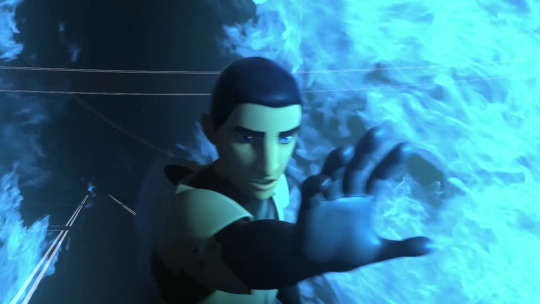
This shot is really, really brief, but I slowed it down to see better. Ezra, while engulfed in the same blue fire, is in the Lothal temple: he’s in the stormtrooper armor from earlier, and the backdrop is the same too. It took me like 930 times watching the trailer to pick up on this. But there now is the bigger threat- the Emperor knows who Ezra is, can probably sense his past (possibly current?) struggles with the Dark Side, and wants Ezra to join him. I’m not sure if they’ll ever meet face-to-face, but it could mean that Thrawn has orders to capture, not kill Ezra.
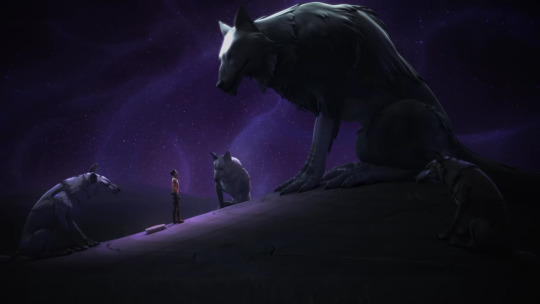
I think this is the King of the Wolves.
Okay, I have no idea what’s actually happening here. Maybe this wolf is like the Bendu- maybe it has answers, maybe it can guide Ezra, but ultimately, I have no idea of the true significance of the wolves. We’ll have answers soon enough though. 12 days left!
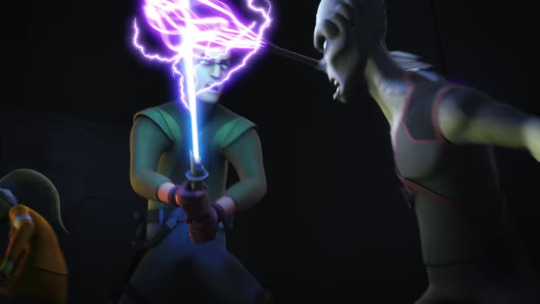
Here is Rukh fighting Kanan! I think is this fairly early on as Hera is still in her prison uniform from earlier (pictured below). The weapon he is using looks like an Electrostaff, like the ones General Grievous’ guards used.
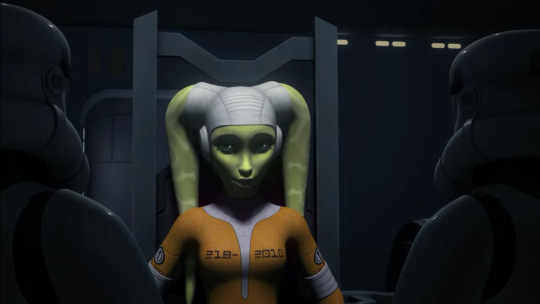
Then, there are shots of more fighting (and Hera being the best pilot in the galaxy) with everyone, from Death troopers to Hondo, Sabine has Ezra’s lightsaber, and the Imperial base flies so that’s exciting BUT THEN
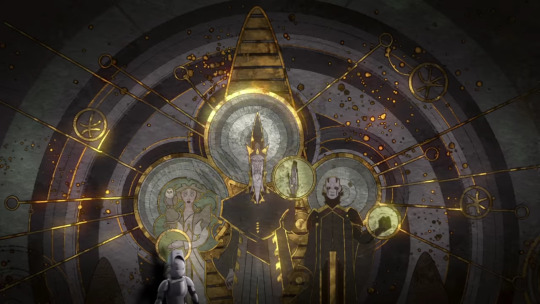
THE BIGGEST AND MOST OBVIOUS REFERENCE TO MORTIS: THIS GIANT MURAL. Given the Lothal mounds behind the Father and that Ezra is still in his stormtrooper armor, this is in the Lothal temple. On the shoulder of the Sister is the Convor, with the same colors as before. I really think, besides Ahsoka, that we will get to see the bigger picture of the Force, as we have with the wolves and the Bendu, and in the Clone Wars with the Mortis arc. Again analyzing shapes, I noticed that there are a lot of circles in this design, similar to the white designs in the previous shots of Ezra in the temple. The left hands of all three figures are circled too- but with my current knowledge, I have no idea if that actually means something. Another continuation in this design is the way the light floods through the background- again, like on Malachor, on Mortis and a little like the stars in the background of the temple.
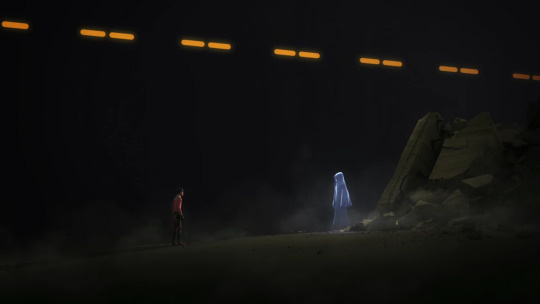
You know, I’m not sure who this is, but if you zoom in, you can see a nose sticking out from the cowl of the cloak. I’m going to say it’s Palpatine. It’s an identifiable feature.
Ezra says: “I know what we have to do know” which answers his question from the FIRST Season 4 trailer, where he was wondering what to do and how to fight. Ezra has new confidence, and I believe he found it with the Force. The majority of the preceding shots have been centered around his relationship with the Force, and his trust in in could lead to the answers he seeks; whatever they may be.
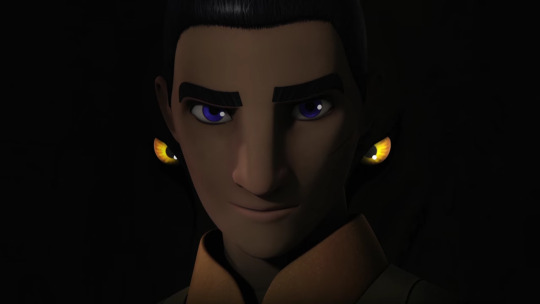
WOLVES IN THE BACKGROUND EPIC AND CONFIDENT EZRA WHAT DOES THIS MEAN?
I’m still not sure. He says “One last lesson” which is really vague and there is so much we don’t know about the wolves. But I truly believe Ezra gains knowledge from the Force and the wolves; there is such great mystery here. Hopefully, all will become clear soon enough.
Then the trailer ends! Really, the overarching message seems to be of family, of hope, and of Ezra’s journey with Lothal and the Force. It’s beautifully done, and I can’t wait to see it played out in the rest of the season. Two weeks to go!
If you read this entire thing, thank you. I know it’s very long, but please discuss! I want to know your thoughts. Agree? Disagree? Let me know!
#star wars rebels#star wars#sw rebels#swr#sw#ezra bridger#chopper#hera syndulla#kanan jarrus#caleb dume#sabine wren#zeb#garazeb orrelios#zeb orrelios#rex#captain rex#gregor#wolffe#commander wolffe#sw theories#kallus#agent kallus#lothal#dave filoni#ahsoka#ahsoka tano#darth vader#thrawn#rebels season 4#mine
49 notes
·
View notes
Text
FMAB rewatch episode 30
Previous Episode
Episode 30: The Ishvalan war of Extermination
This episode is... kinda boring honestly? It’s important to the character’s backstory but it’s, I don’t know, full of really cheesy lines? So much talking about how terrible everything is that I’m wishing there was less talking and more just showing stuff without commentary. (And warning I feel like my overanalysing nature is worse than usual in this episode rewatch.)
It probably doesn’t help that I’ve seen 03 countless times and much of the Ishval backstory happens there so all this war stuff is just really familiar and so it’s not really shocking. Kimblee of all people is actually the highlight.
So the episode opens with Roy talking to his teacher, trying to convince him to pass on his alchemy research to him. Roy is wearing a uniform and has just become a soldier but believes that this is his chance to help people while his Master thinks him a fool and doesn’t wish his secret knowledge to be abused and used for evil. Oh he’s also dying.
Well my conclusion is that they’re both idiots. Flame alchemy is one of the most destructive kinds of alchemy there is. Useful for nothing except burning stuff and Roy will go on to use it to burn people alive. What did they think they would use it for? Maybe if you’re creative it’d be good for cooking or something but Roy has literally just joined the military and seems to believe he needs flame alchemy to succeed. How did he expect it to help!? Showing him as an idealistic soldier wanting to make a positive difference would make so much more sense if he used anything but flame alchemy. Or if he was presented as more ambitious and believes flame alchemy is power and so only gets a greater feeling for morality from the Ishval war, thanks to character development.
Oh well. So episode proper starts with Ed visiting Hawkeye to return her gun. He talks to her about how he feels he was too weak to use it and expresses his fears of how Winry might’ve shot Scar were it not for him and did he make the wrong choice? Riza’s nice to him, suggesting its just some variant of survivor’s guilt, and explains how she’s in no position to judge, having become the sort of person who’s stained by her past actions and can pull the trigger far too easily but that doesn’t make Ed’s choices wrong at all. Then Ed asks about Ishval and Riza tells him about it.
Elsewhere we’ve got Scar demanding Marcoh tell him about Ishval as well.
We see that the war is terrible, lasting seven years until the Fuhrer decided to create a policy, 3066, to exterminate the Ishvalans. And so State alchemists were sent in to exterminate the people. Riza expresses how war can be chaotic but as a sniper she could see exactly who she was aiming at and with every shot she would end a life.
Marcoh reveals that Ishvalans were being used as ingredients to create a Philosopher’s stone. He was part of the operation, in fact. This stone was given to Kimblee so he could be even more destructive, allowing him to wipe out the Ishvalans in mass numbers. Scar recognises the description as the one who killed his brother. Scar is absolutely disgusted by all he’s learning from Marcoh naturally.
We see Roy at his teacher Berthold Hawkeye’s grave with Riza. They’re not familiar with each other yet but seeing Roy’s noble ambitions about how he wants to do good, she agrees to share her father’s research on flame alchemy with him. And Riza also decides to become a soldier herself.
In Ishval, we get some Roy and Hughes interaction as Hughes explains how Gracia is the reason he can continue moving forward and Roy ponders his own reasons. They note that they have the eyes of a killer now and think everything they’re doing is terrible, that it wasn’t what they stood for.
Roy sees Riza and is saddened to see her here as well, that the lovely girl he knew now has the eyes of a killer as well.
Kimblee appears and he just blows to pieces their attempts at trying to be above their actions. They’re still here and they’re still killing, what does it matter that they hate it? With Riza, he suggests she must feel some sort of pride every time she makes a successful shot and as it flashes back to her unflinchingly making a kill, you know he has a point. He reminds them to not turn their eyes away from their actions but to look unflinchingly into the faces of their foes and to never forget them, because they will never forget them. These words are echoed by Riza later on to Ed, so it’s clear she’s taken these words to heart. It’s pretty powerful.
And it’s such a brief scene of them interacting with Kimblee but I love it. Kimblee’s just like them in this moment, following orders given by a higher officer, what does it matter if he enjoys his work and they don’t? The results still the same. And why are they here, anyway?
They became soldiers, surely they should have expected war. Is it because its a civil war, rather than defending the borders against Drachmans or Cretans? What did Roy expect to achieve with his fire alchemy? They can condemn the State all the like but they’re a part of it.
I love to hear Kimblee questioning them on this and you can respect his viewpoint because he doesn’t pretend, he’s very honest about the kind of person he is. (I do question them giving a Philosopher’s stone to someone as chaotic as Kimblee though.)
Anyway, so we jump to the Fuhrer and the part where he’s ordered the extermination policy to go ahead. Some interesting characterisation of him with how he rejects the Ishvalans idea of a god given how many have already been slaughtered by the military and says how you can only trust in your own power. When the Ishvalan leader offers himself as a sacrifice to end the war, Bradley rejects it, stating that one life is now worth thousands and insists on exterminating the ishvalans.
This is pretty remarkable as far as characterisation goes but I feel it’s heavyhanded for a leader. I’m biased but I sort of appreciated how Bradley in 03 constantly had this demeanor of being harmless and friendly, keeping all this ugliness to secret plotting and backrooms, he wouldn’t be so openly villainous. (I think BH!Bradley is a far more interesting Homunculus than 03!Bradley, but I do appreciate how effective 03!Bradley was as a seemingly good leader.)
Anyway, Riza concludes her story with explaining how the military is corrupt and the bad parts need to be removed and the whole system needs to be reformed, which is what Mustang intends to do by attaining power. She also states that all the so-called heroes of the Ishvalan war should be tried as war criminals for their actions. Quite a statement as that condemns likeable characters like Riza and Roy. Edward is upset by this even as Riza seems very calm about the whole thing.
We get one more flashback to after the war where Roy shares his ambitions with Riza and asks her to work with him and watch his back. He adds that it means she has the power to shoot him if she so chooses. Roy states that he trusts her with this power, that if he ever strays from his path, he expects her to shoot him rather than let him go down the dark path.
Hmm... it’s interesting. You know, I’ve seen Roy’s character in 03 criticised for showing him almost killing himself as it’s out of character for Roy. I sort of agree that’s it’s a little too melodramatic and angsty, and you need to accept that 03!Roy and BH!Roy are different characters. BH!Roy certainly doesn’t believe in throwing one’s life away. But this statement is interesting in how it shows that maybe they’re not so different? The moment 03!Roy contemplates suicide is after he’s done a terrible thing in killing a pair of innocent doctors and maybe he genuinely believes he’s fallen too far from the right path and it’d be better if he were dead. He eventually decides to continue living in the best attempt to make up for some of his evil actions. This statement in Brotherhood mostly foreshadows him becoming consumed with revenge in his torture of Envy and he believes Riza will be a better judge of his own morality than him. But still, he’s very clear that he expects Riza to kill him if she thinks he deserves it. I find the parallel interesting anyway.
Sorry... just musing. (Warning for further digressions in this paragraph) Speaking of 03, I think it generally did a better job at showing the devastation and the horror and the trauma as a result of the Ishval war. With more focus on the Ishvalans side, and more moments of extreme weakness from the ‘heroes’. I also find it sort of strange how noble Roy seems to be even before the Ishval war. In 03 we never see any flashbacks from before the war and I think I like that? We can imagine that Roy was perhaps a man like Archer but the war broke him and led to him becoming a person with some trauma but also with higher ideals,. Yes, I know there’s nothing to support this reading in canon but still I wish the Roy before the war seemed more different from the Roy after the war.
Sorry, I’m being too harsh on this poor episode, I know. I should be putting on some Royai shipping glasses or something but I sadly cannot. There’s just too much talking about what’s happening and insufficient explaining about the characters actual motives for me. I understand that they feel bad about it but I want to understand why they choose to participate. How far they’re going. I know they joined the military but why?
I’m probably forgetting some details or misunderstanding something. Maybe I’m just overreading or getting fixated on the wrong stuff. All things considered, this was a pretty alright episode and did explain the events well and I did like how we get much of it through Riza’s perspective and I love the bits where Riza explains being a sniper and the parts with Kimblee. Bradley’s stuff was decent as is the brief bits with Marcoh. Ed talking about his own worries as actually a little boring for me - weird when Ed should be my favourite.
I’ll just end this part here. You know, I think writing about it actually helped me to appreciate it more though. Using its the reverse where I like an episode okay but find plenty of issues when I start to think about it in depth.
#fma#fmab rewatch#the ED is growing on me#You know I don't recall liking kimblee so much after this episode#but I appreciate this introduction#there's a brief scene with Al and Mei I didn't mention#its the scene where Al insists he's better than his brother and she gets a crush on him#random comic relief basically#meta#myposts
1 note
·
View note